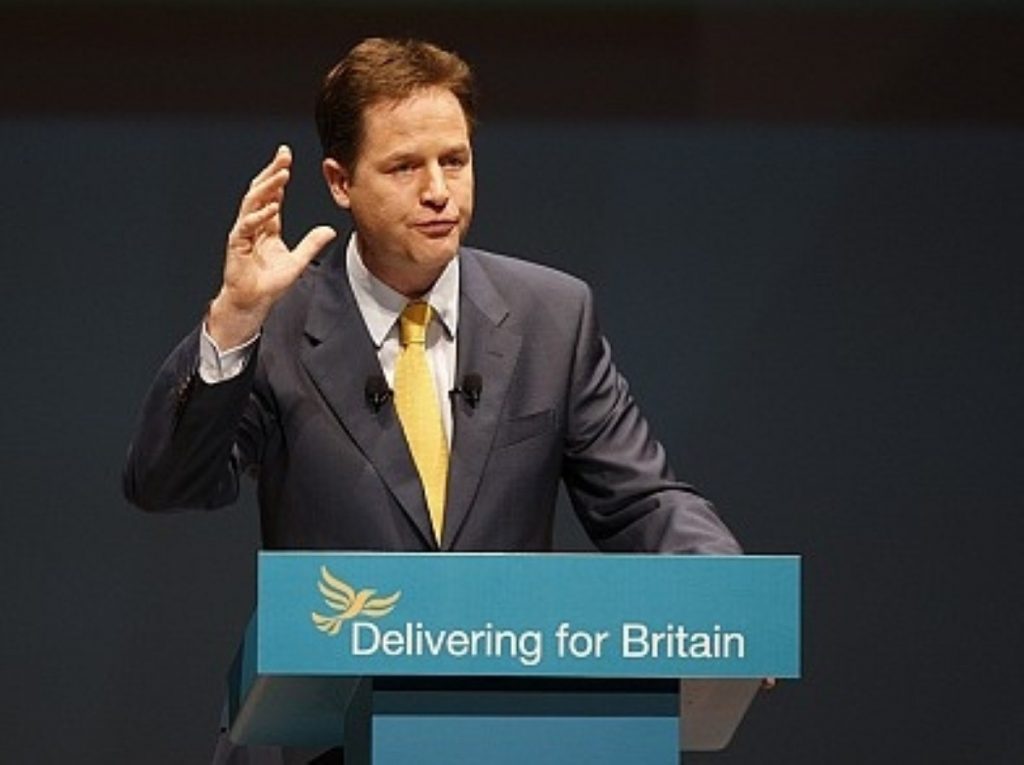Sketch: Clegg conference speech
There’s a scriptwriter trick which comes in particularly useful for thriller plots. Occasionally the writer will come across a plot hole he simply can’t work his way around, or write a storyline so unlikely as to be absurd. The trick is simply to have one of the characters comment on it. You don’t need to resolve it. As long as you mention it, the audience is relieved that you’re aware of what you’re doing, and they’re usually willing to suspend their disbelief again.
By Ian Dunt
Nick Clegg employed a rather similar tactic today when he reeled off Lib Dem concerns about the deficit. It’s a constant refrain when politicians insist that deficit reduction is ultimately progressive. ‘Fine’, comes the response, ‘but why should public sector workers pay for the private sector’s mess?’
That’s a damn good question, and one Clegg singularly failed to answer during his subdued and intellectual speech today. Instead, he hung it out in public, like a scriptwriter. Bankers would have a levy slapped on them, he insisted. We were going to get tough on the financial sector.


It’s not true, of course. Banks will laugh off the government’s lame attempts at taking them to task, whereas public sector workers will certainly not be laughing when they are made unemployed. But Clegg wasn’t concerned with offering real solutions to the evident injustice of it all. He just needed to prove he was aware of it. He had considered it.
Was it enough? Not really. The hall’s response was muted. No standing ovations during the speech, and the applause never rose too far above the respectful. The strongest support, funnily enough, came during the section justifying spending cuts. For a speech delivered to the hall rather than the country, it was a worryingly unconvincing response. There was something quite respectable about it, however, which resolutely avoided any triumphalism, apart from the odd splattering of self-congratulation. The absurd idea that lawyers care, even remotely, when Clegg says the Iraq war was illegal was the pinnacle of that approach. It was a bit embarrassing, frankly.
When applause did come, it was because of that subconscious way that audiences respond to pacing and tone. Somehow we know when we’re meant to clap, so we do. It wasn’t because of content, aside from a short section lambasting Labour.
Clegg himself is hardly the most inspiring speaker. The spasm of Clegg-love that followed the TV debates was inexplicable at the time, and seems even odder now. He’s best when he employs the attempt at honesty. Talking of the coalition agreement, he said, modestly: “I stand by it.” For a short, foolish moment, I believed him. Then he raised his pitch with “I believe it will change Britain for good.” He paused for applause, and it came, but the truth is he was much more effective when playing the principled, honest Joe. Something about his intonation doesn’t work.
It’s worth mentioning that he doesn’t deviate from the script. He really is word-for-word on script in a way very few speakers are. He’s probably the least impromptu speaker I’ve ever seen. The only moments he went off script were as a response to unpredicted audience responses. “Would you let your kids pay your credit card bill?” He asked the audience rhetorically. They didn’t seem to find that as unthinkable a moral damnation as he expected, so he was forced to insist that to them that they wouldn’t.
The only other moment, rather ironically, came during a section on reforming council spending that originally read: “It may not make the pulses race, even at a Liberal Democrat conference…” As it happened, the audience – bless them – broke into applause. So Clegg changed it to: “.although it does here, of course”. The Lib Dems: even more boring than their leader had supposed.
His enthusiastic exit from the conference hall made for enjoyable viewing. The assorted hacks were not allowed to leave, much to general irritation, as they watched Clegg and Miriam (who is just remarkably lovely) leave regally to music and lights. There were quite a few substantial egos being obstructed and it was all very pleasant. Of greater interest were Clegg’s hug/shake decisions. Danny Alexander got a warm hug – a rather appalling sight, as it happens. The man who used to be known as St Vince got a quick and not-so-friendly handshake.
It was a respectfully intellectual speech that didn’t skirt the sore points, so you have to say fair enough to that. His reward was a lukewarm reception, so what you have to ask is: what’s it going to be like next year. Clegg remains the most hard done by of the party leaders, his poll rating plummeting and his party nervous of his charms. By the time the 2015 election comes, I’m guessing the ravages of power may have faded somewhat.

